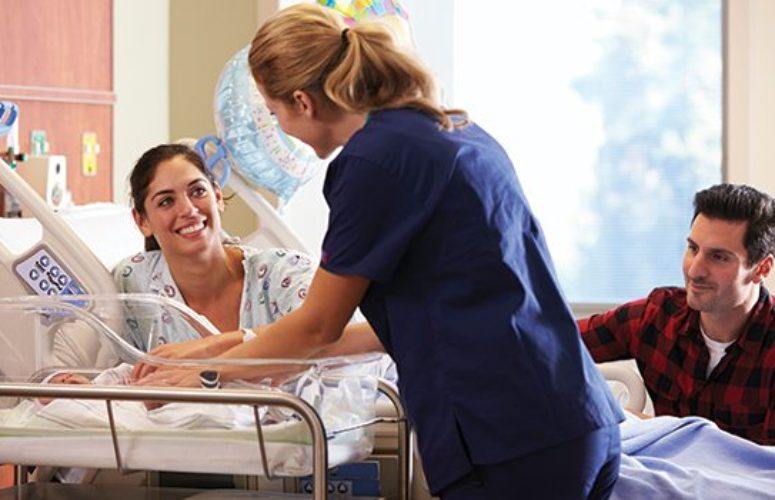
Hospitals ‘Deliver’ Maternity Care
Discover the changing roles these healthcare institutions play during pregnancy, birth and infant care.
By Jennifer L. Nelson, Contributing Writer On Oct 3, 2016One of a hospital’s most important roles is to foster healthy pregnancies and safe childbirths by providing the highest level of medical care before, during and after a woman’s pregnancy. To that effect, the Garden State’s hospitals are creating a lifelong foundation of health and wellness for both newborns and their mothers through an array of services ranging from nutritional counseling to genetic testing as well as cutting-edge innovations in ultrasound and state-of-the-art advances in childbirth.
“We believe that education and support are among the best ways to facilitate healthy pregnancies and safe childbirth … and we take very seriously our role as a provider of health and wellness education to help pregnant women and their babies build a healthy foundation that will last a lifetime,” asserts Dr. Gail M. Matthews, chair of women’s services, department director of obstetrics and gynecology, and medical director of maternal fetal medicine at Valley Medical Group.
That’s why New Jersey hospitals have continued to expand their services for expectant mothers, not only through individualized medical care, but also educational services and offerings such as holistic birth programs. Today’s hospital maternal staff may be comprised of a multi-disciplinary team of experts, including physicians along with ultrasonographers, genetic counselors, and perinatal nurses. At Valley, for example, that team of experts also includes board-certified neonatologists and pediatric subspecialists, neonatal nurses, respiratory therapists, pediatric pharmacists, pediatric occupational/physical therapists, social workers, and lactation consultants.
Additionally, some New Jersey hospitals are also offering holistic birth services and expanding their teams with midwives and other holistic specialists. According to Dr. Matthews, research has shown that holistic childbirth techniques can alleviate the need for interventions that often lead to cesarean sections, such as labor-inducing medications, epidural pain medications, or bed confinement due to continuous fetal monitoring. “These are not new theories or ideas, but ones that have been practiced successfully and humanely for hundreds of years by midwives, nurses, doulas and other birth attendants all over the world,” she says.
Saint Peter’s University Hospital is also beginning the process of adding midwifery to its services by partnering with certified nurse midwives. “They bring a philosophy and approach to the table that a lot of women are interested in,” says Dr. Edwin Guzman, chair of obstetrics and gynecology for Saint Peter’s University Hospital. According to Dr. Guzman, midwives have been associated with excellent perinatal outcomes such as lower episiotomy and cesarean section rates. “There are many women who would prefer to deliver their babies in a home environment … and now they can have the best of both worlds with a low-tech, natural approach by a team of midwives, but still take advantage of the medical sophistication that a hospital can provide should anything go wrong.”
Hospitals are also working hard to create the most comfortable environments that still promote patient safety for mothers-to-be within maternal care units. At Englewood Hospital and Medical Center, the labor and delivery unit features in-room music, docking stations, and private bathrooms with whirlpool tubs for hydrotherapy for pain management. The unit is also equipped with specially designed infant radiant warmers, featuring oxygen, oxygen monitoring, suction and continuous positive airway pressure, and also houses state-of-the-art incubators, electronic birthing mirrors, monitors and ventilators.
“We offer these extra touches to enhance the childbirth experience. The state-of-the-art labor and delivery unit was designed with modern amenities such as hydrotherapy suites and rooms that accommodate natural childbirth and those looking for pain management. But the aesthetics such as soft lighting, natural colors, and comfortable seating also create a calming and relaxing environment for moms and babies,” says Dr. Arthur Gross, OB/GYN at Englewood Hospital and Medical Center, who also practices at Englewood Women’s Health.
Many of the state’s hospitals have also made it their mission to provide exceptional care for patients who may be at increased risk for complications during their pregnancy or delivery. Englewood Hospital’s neonatal intensive care unit (NICU) addresses the unique needs of high-risk mothers and newborns. Some of the state’s hospitals are diagnostic referral centers, certified by the American Institute of Ultrasound in Medicine (AIUM), to care for women who may be at an increased risk for complications during pregnancy after age 35, such as high blood pressure, diabetes or other medical conditions, or if they are carrying more than one fetus, experience pre-term labor, or have a history of pregnancy-related complications. “We are a regional perinatal referral center, so we have maternal fetal specialists on hand who have a great deal of expertise in taking care of moms who are high-risk, and can provide those additional services for babies who may be dealing with some medical issues, including surveillance and genetic testing, as well as a neonatal intensive care unit staffed by neonatologists and neonatal nurse practitioners who provide robust services and compassionate care for the smallest, sickest or premature babies,” says Robyn Harvey, executive director of the women and children’s institute at Cooper University Health Care.
Among the most important advances in maternal-fetal medicine has been the technological development of ultrasounds. The state’s hospitals offer both 3D and 4D ultrasounds, which have enhanced the level of accuracy in imaging and also provide increased precision to assist in the diagnosis of any potential issues with the fetus.
Other technological advancements include tools that allow physicians to detect pre-term risk through biochemical screenings, while labs can test for a range of things that were unheard of 20 years ago, Dr. Gross notes. Of course, the use of electronic medical records has also improved patient safety by allowing all physicians and specialists to access potentially life-saving information about a woman and her unborn child at their fingertips. “Innovations and safer surgical techniques have been revolutionary in being able to treat mothers at risk or in pre-term labor, and advances in care for pre-term and low-birth weight babies have also been extraordinary,” he adds.
In fact, many Garden State hospitals are utilizing high-tech ultrasound techniques to diagnose problems such as congenital heart defects. Fetal echocardiography relies on these non-invasive ultrasound techniques to assess the structure and function of an unborn baby’s heart. “This test may be needed if parents have a family history of congenital heart defects, or if it’s difficult to visualize all of the parts of the heart at the time of a routine anatomical screening,” Dr. Matthews explains.
At Hackensack University Medical Center, physicians in the maternal-fetal medicine unit are also utilizing the latest diagnostic tools to detect any fetal abnormalities, and are one of few hospitals in the tri-state area that are trained and equipped to perform interventional procedures inside the womb. The hospital also provides assessments for patients who have had complications in previous pregnancies to identify and treat risk factors, minimize potential side effects, and provide better outcomes for both mothers and their newborns.
One of the other services that is making HUMC a national leader in maternal-fetal care is its abnormal placentation program, as complications with the placenta remain one of the leading causes of death in childbirth. “We offer a comprehensive, multi-disciplinary team approach to deal with placental abnormalities, and have almost a 100 percent success rate in terms of our outcomes when surgical intervention is required,” says Dr. Manuel Alvarez, chairman of obstetrics and gynecology at the Donna A. Sanzari Women’s Hospital at Hackensack University Medical Center.
One of the fastest growing fields in maternal medicine is genetic testing and screening for abnormal chromosomes. “With a non-invasive prenatal blood test, we’re now able to give expectant mothers a good idea of what their baby’s risk will be for diseases like Down Syndrome,” explains Dr. Robin Perry, chair of obstetrics and gynecology for Cooper University Health Care. “The technology isn’t yet strong enough to be considered a diagnostic tool, but it does serve as an excellent screening test.”
Among the challenges faced by the state’s maternal-fetal departments has been the increasing rate of cesarean sections, along with early elective deliveries. “Ten years ago, we thought it was safe to allow women to deliver three weeks to one week prior to their due date … pregnancy gets really uncomfortable and potentially painful at the end, and many women want to deliver as early as they possibly can,” Dr. Perry explains. “But because of new data and despite the trend of women wanting to schedule their deliveries, we strive to ensure that no babies are delivered prior to the 39-week mark.”
Of course, the role of the hospital doesn’t end with a healthy, full-term delivery. The state’s hospitals are enhancing their educational and support services to help new moms make the best choices possible for their babies, both before and after childbirth. For example, Saint Peter’s offers group sessions for women both before and after delivery in an outpatient clinic environment. “We offer group meetings consisting of physicians and women who all may be in the same trimester, and that connect new moms with women who have multiple children,” Dr. Guzman explains.
After a woman gives birth, hospitals like Cooper University Health Care are also providing educational breastfeeding services and support. Some of the hospital’s other initiatives also keep a new mother’s well-being in mind, such as a skin-to-skin approach immediately after delivery. “After a baby is delivered, we put the baby right up to the mom’s chest to create that skin-to-skin contact and immediate bonding between mother and child,” Harvey says. “We see ourselves as an integral partner in a woman’s journey to start or build her family … and we’re here to support her and make sure that she feels confident in her decisions on how to give her baby the healthiest start in life.”
Related Articles:






